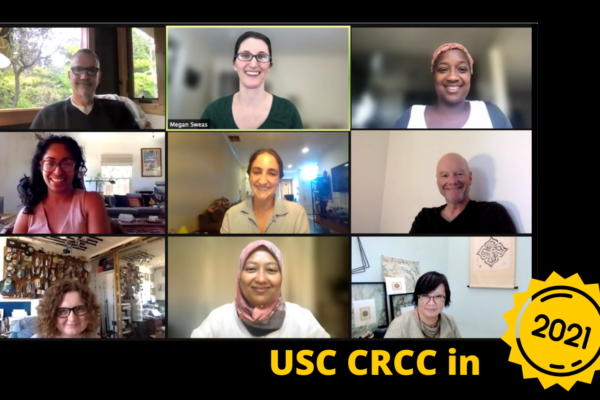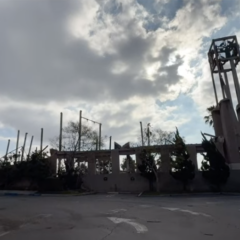It is hard to believe that we are just weeks away from the end of 2021 and a new year is on the horizon. The year has continued to be difficult for many, and CRCC has continued its work, adapting how we operate within the limitations imposed by the reality of the pandemic.
Of necessity, we have moved our programming and core research efforts primarily online—research interviews, visits to and with faith groups, meetings and programming sessions now take place through our computer screens. While advances in digital technology have enabled us—and most everyone—to continue to work and interact with each other, I know that we’re all a little tired of that being the primary mode in which we communicate and connect with each other. Yet, we are thankful that we have been able to continue our work, both our research and our trainings with different faith groups who are all seeking better ways to bring their religious values into effective service in their communities.
As with the end of the year being suddenly upon us, it is also a bit surprising for me that my tenure as the executive director at CRCC is approaching the six-month mark. I took on the responsibility of leading CRCC back in July, and since that time we have been busy on several fronts plotting the near- and longer-term future of CRCC. Many of our conversations have focused on potential new research and public engagement projects that will continue our work on large issues of concern, both locally and globally. We’ll have more to say about these plans as they firm up in the new year.
We have also spent a good amount of time thinking through how CRCC is organized internally, how our work is distributed across our staff, and how we conceptualize and describe our work. One outcome of those discussions is a new set of statements on “who we are” that we think both simplifies and clarifies–well, who we are, what we do and how we go about our work. We look forward to unveiling this language and some additional changes in the new year.
CRCC staff has not met together as a team since the pandemic shutdown in March 2020. Not only have we missed the in-person interaction and community that is at the core of CRCC, but being together in person has the added benefit of enhancing our creative capacities through our sharing of ideas and new discoveries. Starting in January 2022, we are planning to inch back toward being together in the CRCC offices, with, of course, all necessary health precautions in place. We are looking forward not only to being together as colleagues, but also to what we will be working on in the new year and beyond.
Below is a highlight list of what we’ve been up to in 2021.
We look forward to seeing and working with you in the year to come.
CRCC in 2021
Richard Flory became our executive director in July. Read his vision.
He and Diane Winston (USC Annenberg and CRCC Fellow) published Religion in Los Angeles: Religious Activism, Innovation and Diversity in the Global City, available on Amazon.
In March, we partnered with local public radio station KPCC on a series of reflections from LA faith leaders after a year of pandemic lockdown.
Najuma Smith Pollard, now our assistant director of community relations, continues to be a voice for justice in our city (and was honored as a Giant of Justice by CLUE-LA). She also reopened her church and shared her advice on how to operate a house of worship in a pandemic.
Tarra McNally offered her public health expertise in giving faith leaders 5 ways to promote vaccine access.
Hebah Farrag joined Aspen Institute’s Racial Justice Commission and was quoted in Sojourners about the spirit of Black Lives Matter.
We continued to write from pre-pandemic research and travel:
Nick Street published a dispatch on the Philippines (and more to come from Hawaii and Nigeria).
Megan Sweas wrote about Plum Village’s simple lifestyle for Yes! magazine.
Don Miller wrote and produced a video about Jean Bouchebel, an exemplary humanitarian working in Lebanon.
Nalika Gajaweera was our most published staff member, with several articles and multiple speaking events. Most recently, she published a piece on Asian American Buddhists reclaiming “cultural baggage” in Buddhadharma: The Practitioner’s Quarterly. She also edited a special issue of the Journal of Global Buddhism on Buddhism and resilience, with a piece on her CRCC research with BIPOC practitioners of mindfulness, which she also presented at the Buddhism and Breath Summit:
CRCC’s public programming included several “Critical Conversations,” notably two in partnership with the FBI, and webinars on building wealth (you can sign up for our January/February sessions here). AMCLI celebrated its 15th year, with Soraya Ahyaudin leading its first virtual retreat. Our Thriving Congregations initiative continued its conversations with innovative faith leaders and is working on in-person plans for the new year.
And, our managing director Napah Phyakul Quach led us in the great office clean-up of 2021 (anybody want an old-school projector?!). Now we can meet in person in a reorganized and de-cluttered office space!
Finally, as you may know, we take a crack each year at predictions about what might be leading developments in religion and spirituality for the year to come. Take a look at our predictions for 2021 to see how we did, and what we missed. We’re working on our predictions for 2022, which we’ll publish in January.
Richard Flory is the executive director of the USC Center for Religion and Civic Culture.





